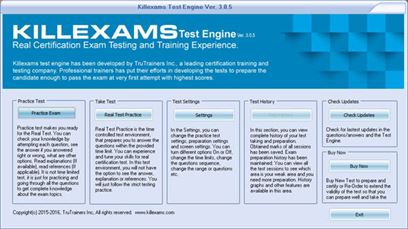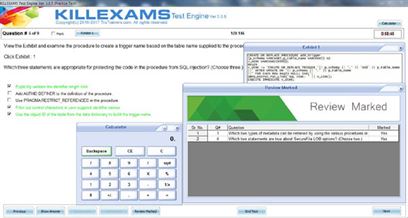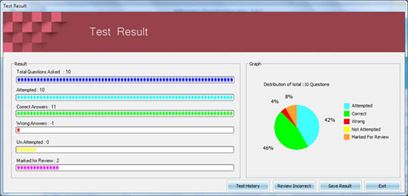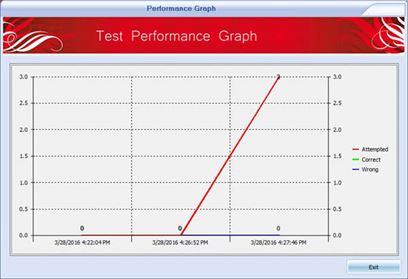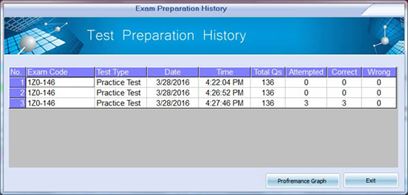SUSE Certified Linux Administrator 12 Exam Braindumps
Killexams.com 050-733 Exam Braindumps contain complete question pool, updated in October 2024 including VCE exam simulator that will help you get high marks in the exam. All these 050-733 exam questions are verified by killexams certified professionals and backed by 100% money back guarantee.
Whilst it is very hard task to choose reliable exam Dumps resources regarding review, reputation and validity because people get ripoff due to choosing incorrect service. Killexams make it sure to provide its clients far better to their resources with respect to study guide update and validity. Most of other peoples ripoff report complaint clients come to us for the brain dumps and pass their exams enjoyably and easily. We never compromise on our review, reputation and quality because killexams review, killexams reputation and killexams client self confidence is important to all of us. Specially we manage killexams.com review, killexams.com reputation, killexams.com ripoff report complaint, killexams.com trust, killexams.com validity, killexams.com report and killexams scam. If perhaps you see any bogus report posted by our competitor with the name killexams ripoff report complaint internet, killexams.com ripoff report, killexams.com scam, killexams.com complaint or something like this, just keep in mind that there are always bad people damaging reputation of good services due to their benefits. There are a large number of satisfied customers that pass their exams using killexams.com brain dumps, killexams PDF questions, killexams practice questions, killexams exam simulator. Visit our test questions and trial brain dumps, our exam simulator and you will definitely know that killexams.com is the best brain dumps site.
Is Killexams.com Legit?
Sure, Killexams is hundred percent legit and also fully reliable. There are several characteristics that makes killexams.com unique and straight. It provides updated and hundred percent valid study guide that contain real exams questions and answers. Price is surprisingly low as compared to the majority of the services on internet. The Dumps are up graded on common basis with most latest brain dumps. Killexams account structure and merchandise delivery is quite fast. Record downloading will be unlimited and extremely fast. Guidance is avaiable via Livechat and E mail. These are the features that makes killexams.com a strong website that provide study guide with real exams questions.
Is killexams dumps dependable?
Simple answer is YES. There are several Dumps provider in the market claiming that they provide actual exam Questions, Braindumps, Practice Tests, Study Guides, cheat sheet and many other names, but most of them are re-sellers that do not update their contents frequently. Killexams.com is best website of Year 2024 that understands the issue candidates face when they spend their time studying obsolete contents taken from free pdf download sites or reseller sites. Thats why killexams.com update exam Dumps with the same frequency as they are updated in Real Test. study guide provided by killexams.com are Reliable, Up-to-date and validated by Certified Professionals. They maintain dumps questions of valid Questions that is kept up-to-date by checking update on daily basis.
If you want to Pass your exam Fast with improvement in your knowledge about latest course contents and subjects of new syllabus, We recommend to download PDF exam Questions from killexams.com and get ready for actual exam. When you feel that you should register for Premium Version, Just choose visit killexams.com and register, you will receive your Username/Password in your Email within 5 to 10 minutes. All the future updates and changes in Dumps will be provided in your download Account. You can download Premium study guide files as many times as you want, There is no limit.
Killexams.com has provided VCE practice exam Software to Practice your exam by Taking Test Frequently. It asks the Real exam Questions and Marks Your Progress. You can take test as many times as you want. There is no limit. It will make your test prep very fast and effective. When you start getting 100% Marks with complete Pool of Questions, you will be ready to take actual Test. Go register for Test in Exam Center and Enjoy your Success.
Other SUSE exam dumps
SCA_SLES15 cram | 050-733 pass exam |
050-733 - SUSE Certified Linux Administrator 12 education
050-733 - SUSE Certified Linux Administrator 12 PDF Dumps
050-733 - SUSE Certified Linux Administrator 12 education
050-733 - SUSE Certified Linux Administrator 12 Free exam PDF
050-733 - SUSE Certified Linux Administrator 12 exam dumps
050-733 - SUSE Certified Linux Administrator 12 book
050-733 - SUSE Certified Linux Administrator 12 PDF Questions
050-733 - SUSE Certified Linux Administrator 12 Test Prep
050-733 - SUSE Certified Linux Administrator 12 exam dumps
050-733 - SUSE Certified Linux Administrator 12 PDF Questions
050-733 - SUSE Certified Linux Administrator 12 Test Prep
050-733 - SUSE Certified Linux Administrator 12 Cheatsheet
050-733 - SUSE Certified Linux Administrator 12 questions
050-733 - SUSE Certified Linux Administrator 12 boot camp
050-733 - SUSE Certified Linux Administrator 12 information hunger
050-733 - SUSE Certified Linux Administrator 12 information source
050-733 - SUSE Certified Linux Administrator 12 study help
050-733 - SUSE Certified Linux Administrator 12 real questions
050-733 - SUSE Certified Linux Administrator 12 outline
050-733 - SUSE Certified Linux Administrator 12 exam
050-733 - SUSE Certified Linux Administrator 12 Study Guide
050-733 - SUSE Certified Linux Administrator 12 Questions and Answers
050-733 - SUSE Certified Linux Administrator 12 PDF Download
050-733 - SUSE Certified Linux Administrator 12 certification
050-733 - SUSE Certified Linux Administrator 12 information search
050-733 - SUSE Certified Linux Administrator 12 study help
050-733 - SUSE Certified Linux Administrator 12 exam
050-733 - SUSE Certified Linux Administrator 12 Cheatsheet
050-733 - SUSE Certified Linux Administrator 12 book
050-733 - SUSE Certified Linux Administrator 12 Practice Test
050-733 - SUSE Certified Linux Administrator 12 Study Guide
050-733 - SUSE Certified Linux Administrator 12 exam Questions
050-733 - SUSE Certified Linux Administrator 12 Practice Questions
050-733 - SUSE Certified Linux Administrator 12 answers
050-733 - SUSE Certified Linux Administrator 12 techniques
050-733 - SUSE Certified Linux Administrator 12 certification
050-733 - SUSE Certified Linux Administrator 12 book
050-733 - SUSE Certified Linux Administrator 12 PDF Questions
050-733 - SUSE Certified Linux Administrator 12 Questions and Answers
050-733 - SUSE Certified Linux Administrator 12 real questions
050-733 - SUSE Certified Linux Administrator 12 braindumps
050-733 - SUSE Certified Linux Administrator 12 test
050-733 - SUSE Certified Linux Administrator 12 test
050-733 - SUSE Certified Linux Administrator 12 information source
Best Certification study guide You Ever Experienced
ICDL-WINDOWS actual Questions | NSE5_FCT-7.0 braindumps | ISO-IEC-27001-Lead-Auditor PDF Download | S90.03A study guide | PB0-200 braindumps | WOCNCB-CFCN exam Questions | 2B0-015 online exam | Salesforce-Loyalty-Management assessment test sample | DHORT Questions and Answers | UIPATH-ARDV1 exam dumps | PMHCNS-BC examcollection | PHR mock exam | CLAD Practice test | TA12 practice test | HH0-210 questions answers | FNS exam prep | 250-351 test prep | CPUX-F exam prep | VACC practice exam | 1T6-222 questions and answers |
Latest Updated Exams
ACA-CCN exam tips | ACNPC-AG Practice test | ACHPN real questions | ACCNS-AG english test questions | ABWM-CWS Free exam PDF | ABNN-SCRN real questions | AANP-AGNP exam dumps | AACN-CSC PDF Braindumps | CNRN test prep | AACN-CCRN-K test example | NAB-NHA exam questions | ACNP-BC online exam | ACCNS-P VCE | ACRP-CCRC braindumps | AACN-CNL PDF Questions | ACLPN free prep | HANCB-ACRN examcollection | ACCNS-N practice questions | ACNS-BC free pdf | ABWM-CWCA exam questions |
References :
http://killexams-braindumps.blogspot.com/2020/06/free-050-733-exam-dumps-questions-by.html
https://killexams-posting.dropmark.com/817438/23718057
https://killexams-posting.dropmark.com/817438/23756684
https://www.instapaper.com/read/1322183837
http://feeds.feedburner.com/Killexamscom050-733SuseCertifiedLinuxAdministrator12ExamBrainDumpsWithPracticeSoftware
https://www.coursehero.com/file/67047094/SUSE-Certified-Linux-Administrator-12-050-733pdf/
https://sites.google.com/view/killexams-050-733-free-exam-pd
https://youtu.be/9SCZQ7NFFOM
http://acountdigy1.blogdigy.com/050-733-suse-certified-linux-administrator-12-2021-updated-dumps-by-killexams-com-11431339
https://files.fm/f/7q6zvj4ps
Similar Websites :
iKillexams Certification exam dumps
Pass4Sure exam Questions and Dumps
Killexams.com 050-733 Exam Simulator Screens
Exam Simulator 3.0.9 uses the actual SUSE 050-733 questions and answers that make up Exam Braindumps. 050-733 Exam Simulator is full screen windows application that provide you the experience of same test environment as you experience in test center.
About Us
We are a group of Certified Professionals, working hard to provide up to date and 100% valid test questions and answers.

Who We Are
We help people to pass their complicated and difficult SUSE 050-733 exams with short cut SUSE 050-733 Exam Braindumps that we collect from professional team of Killexams.com
What We Do
We provide actual SUSE 050-733 questions and answers in Exam Braindumps that we obtain from killexams.com. These Exam Braindumps contains up to date SUSE 050-733 questions and answers that help to pass exam at first attempt. Killexams.com develop Exam Simulator for realistic exam experience. Exam simulator helps to memorize and practice questions and answers. We take premium exams from Killexams.com
Why Choose Us
Exam Braindumps that we provide is updated on regular basis. All the Questions and Answers are verified and corrected by certified professionals. Online test help is provided 24x7 by our certified professionals. Our source of exam questions is killexams.com which is best certification exam Braindumps provider in the market.
Happy clients
Vendors
Exams Provided
Testimonials
Contact Us
We provide Live Chat and Email Support 24x7. Our certification team is available only on email. Order and Troubleshooting support is available 24x7.
4127 California St,
San Francisco, CA 22401

+1 218 180 22490

